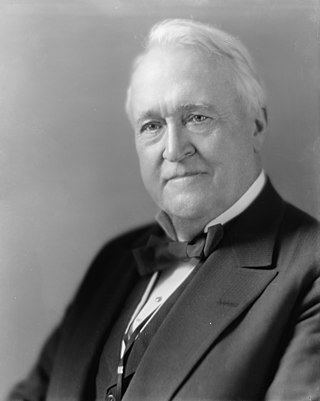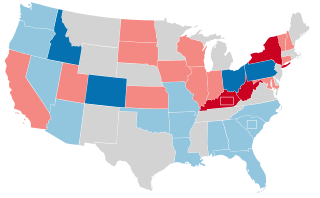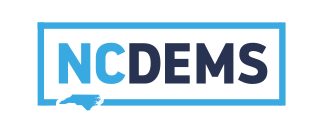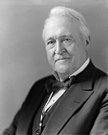
Lee Slater Overman was a Democratic U.S. senator from the state of North Carolina between 1903 and 1930. He was the first US Senator to be elected by popular vote in the state, as the legislature had appointed senators prior to passage of the 17th Amendment to the US Constitution authorizing popular elections of senators. He served as a senator until 1930 when he died when he was two years into his fifth term.
The Democratic Senatorial Campaign Committee (DSCC) is the Democratic Hill committee for the United States Senate. Its purpose is to elect Democrats to the United States Senate. The DSCC's current Chair is Senator Gary Peters of Michigan, who succeeded Nevada's Catherine Cortez Masto after the 2020 Senate elections. DSCC's current executive director is Christie Roberts.

The 1966 United States Senate elections were elections on November 8, 1966, for the United States Senate which occurred midway through the second term of President Lyndon B. Johnson. The 33 seats of Class 2 were contested in regular elections. Special elections were also held to fill vacancies. With divisions in the Democratic base over the Vietnam War, and with the traditional mid-term advantage of the party not holding the presidency, the Republicans took three Democratic seats, thereby breaking Democrats' 2/3rds supermajority. Despite Republican gains, the balance remained overwhelmingly in favor of the Democrats, who retained a 64–36 majority. Democrats were further reduced to 63–37, following the death of Robert F. Kennedy in June 1968.

The 1962 United States Senate elections was an election for the United States Senate. Held on November 6, the 34 seats of Class 3 were contested in regular elections. Special elections were also held to fill vacancies. They occurred in the middle of President John F. Kennedy's term. His Democratic Party made a net gain of four seats from the Republicans, increasing their control of the Senate to 68–32. However, this was reduced to 67–33 between the election and the next Congress, as on November 18, 1962, Democrat Dennis Chávez, who was not up for election that year, died. He was replaced on November 30, 1962, by Republican appointee Edwin L. Mechem. Additionally, Democrat Strom Thurmond became a Republican in 1964, further reducing Democrats to 66–34. This was the first time since 1932 that Democrats gained seats in this class of Senators.

The 1956 United States Senate elections were elections for the United States Senate that coincided with the re-election of President Dwight D. Eisenhower. The 32 seats of Class 3 were contested in regular elections, and three special elections were held to fill vacancies. Although Democrats gained two seats in regular elections, the Republicans gained two seats in special elections, leaving the party balance of the chamber unchanged.

The 1982 United States House of Representatives elections was an election for the United States House of Representatives held on November 2, 1982, to elect members to serve in the 98th United States Congress. They occurred in the middle of President Ronald Reagan's first term, whose popularity was sinking due to economic conditions under the 1982 recession. The President's Republican Party lost seats in the House, which could be viewed as a response to the President's approval at the time. Unlike most midterm election cycles, the number of seats lost—26 seats to the Democratic Party—was a comparatively large swap. It included most of the seats that had been gained the previous election, cementing the Democratic majority. Coincidentally, the number of seats the Democrats picked up (26), was the exact amount the Republicans would have needed to win the House majority. It was the first election held after the 1980 United States redistricting cycle.

The North Carolina Democratic Party (NCDP) is the North Carolina affiliate of the Democratic Party. It is headquartered in the historic Goodwin House, located in Raleigh.

The 2008 South Carolina Senate election were held on Tuesday, November 4, 2008. The primary elections were held on June 10 and the runoff elections were held two weeks later on June 24. The current composition of the state delegation is 27 Republicans and 19 Democrats. Senators are elected for four-year terms, all in the same year.

The 1996 United States presidential election in North Carolina took place on 5 November 1996 as part of the 1996 United States presidential election. Voters in North Carolina chose 14 representatives, or electors to the Electoral College, who voted for president and vice president.

The 1932 United States Senate election in North Carolina was held on November 8, 1932. Interim Democratic senator Cameron A. Morrison ran for election to a full term, but was defeated in the Democratic primary by Robert Rice Reynolds. Reynolds defeated Republican Jacob F. Newell in the general election.

The 1920 United States Senate election in North Carolina was held on November 2, 1920. Incumbent Democratic Senator Lee Slater Overman was re-elected to a fourth term in office, defeating Republican A. E. Holton.

The 1926 United States Senate election in North Carolina was held on November 2, 1926. Incumbent Democratic Senator Lee Slater Overman was re-elected to a fifth term in office, defeating Republican Johnson Jay Hayes.

The 2020 United States House of Representatives elections in North Carolina were held on November 3, 2020, to elect the 13 U.S. representatives from the state of North Carolina, one from each of the state's 13 congressional districts. The elections coincided with the 2020 U.S. presidential election, as well as other elections to the House of Representatives, elections to the United States Senate and various state and local elections.

The 1922 United States Senate election in New York was held on November 7, 1922. Incumbent Republican Senator William Calder ran for re-election to a second term, but was defeated by Democrat Royal Copeland.

The 1940 North Carolina gubernatorial election was held on November 5, 1940. Democratic nominee J. Melville Broughton defeated Republican nominee Robert H. McNeill with 75.70% of the vote.

The 2022 United States House of Representatives elections in North Carolina were held on November 8, 2022, to elect U.S. representatives from the state of North Carolina, concurrent with nationwide elections to the House of Representatives and U.S. Senate, alongside legislative elections to the state house and senate. Primaries were held on May 17, 2022.

The 1896 North Carolina gubernatorial election was held on November 3, 1896. Republican nominee Daniel Lindsay Russell defeated Democratic nominee Cyrus B. Watson with 46.52% of the vote. This was the only election in North Carolina between 1872 and 1972 in which the Republican nominee won the governor's office, and the only one until 2016 in which no candidate received over 50% of the vote.

An election was held on November 3, 2020, to elect all 50 members to North Carolina's Senate. The election coincided with the elections for other offices, including the Presidency, U.S. Senate, Governor, U.S. House of Representatives, and state house. The primary election was held on March 3, 2020, with a run-off on June 23, 2020.

An election was held on November 8, 2022, to elect all 50 members to North Carolina's Senate. The election coincided with the elections for other offices, including the U.S. Senate, U.S. House of Representatives, and state house. The filing period lasted from February 24, 2022, to March 4, 2022, with the primary election being held on May 17, 2022. The elections were originally to be held under new districts passed by the General Assembly in Senate Bill 739 to account for population changes following the 2020 census; however, following a ruling by the North Carolina Supreme Court, the General Assembly redrew the maps to comply with the court's ruling.

The North Carolina Council of State elections of 2024 were held on November 5, 2024, to select the ten officers of the North Carolina Council of State. These elections coincided with the presidential election, elections to the House of Representatives, elections to the North Carolina General Assembly and top state courts. Primary elections took place on March 5, 2024, for offices for which more than one candidate filed per party.












